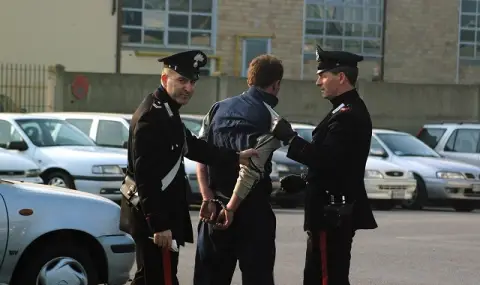"In Naples, you can be killed for stepping on someone's shoe, for giving them a stupid look or for looking at someone's girlfriend." Many young people lose their lives in ridiculous ways. And guns can be found for 80 euros.
Wherever you look in this city, you will see images of young men. Their obituaries stand next to the face of Maradona, the unofficial saint of Naples. The images tell the story of a city that has learned to live with crime, but which still cannot accept that the lives of its young people can be cut short in such a brutal way.
"You can be killed for something completely trivial – because you stepped on someone's shoe, looked at them stupidly or because you were looking at someone's girlfriend. The values of these children do not exist and they react to extremes, for example by stabbing someone with a knife", Salvatore Esposito told DW.
The professional photographer knows the dark sides of Naples - the places in the center or on the outskirts where crimes are often committed. He says that in recent months the number of cases in which the perpetrator or the victim, or both, are minors has increased sharply. Esposito gives the example of a 17-year-old who shot a boy his age because he accidentally stepped on his designer sneakers worth 500 euros.
Naples has changed. On the black market, a gun can now be bought for 80 or 90 euros. Esposito suggests that the Camorra has lost control over the youth.
"Young people don't feel safe. When you see that practically everyone is armed, you arm yourself too, so you can protect yourself," says the photographer.
Joe's murder that shook Naples
The case of Giovanbattista Cutolo, who in August 2023 was celebrating a birthday outside with friends, is indicative. After another group began to tease a boy from the group, Giovanbattista stood up to defend him.
"Joe's killer was standing behind him. He laughed, then stood up and shot the boy in the back. Joe tried to escape, but was shot a second time, and after he fell to the ground, the attacker shot him in the chest as well, then went to play poker," says the victim's mother, Daniela DiMaggio.
The 24-year-old was a talented chorister and studied at the conservatory. His killer is a 16-year-old boy with an extensive criminal record. Daniela refuses to give his name: "I will not pay any more attention to my son's killer. He killed a very special person for me, an angel. And someone needs to make him realize that he is a murderer. If that doesn't happen, he may kill others.".
"Juveniles know that they will not be punished severely. I often hear things like: I'm a minor, the risk is minimal, even if I do the worst thing you can imagine," says Salvatore Esposito.
This is probably what Giuseppe thought, who tried to kill another boy with a knife when he was just 13 years old. He lives in Casa Jonathan, a home for young men sentenced to prison for juvenile offenses who are serving the remainder of their sentences on probation. The project aims to break the cycle of violence and imprisonment for young people. "Yes, of course, everyone has guns. It's become a fashion. And if you have a gun, you use it. But of course, that's not an excuse - to have a gun just because everyone else has one," says Giuseppe.
Friend or foe? With me or against me?
At Casa Jonathan, young people are prepared to lead a normal daily life: to take care of the house, to go back to school, to learn a profession or simply to show respect for the people they live with. But there is no guarantee that they will not commit a crime again.
"For me, the criterion for the success of this institution is whether we can break this view of life and the world. This black and white thinking - with me or against me, friend or enemy. We want offenders to open the window a little and see the world in all its colors and shades," says Vincenzo Morgera from the Casa Jonathan initiative.
Salvatore Esposito believes that people can change when their views on life and the world change. He is also convinced that the real work should be done by the parents.
"You can't stop your child from going out into the street and facing the world, and anything can happen there. Of course, the main responsibility falls on the parents - always and everywhere. They are also responsible for mistakes. They should be able to say: my child made a mistake", says Salvatore Esposito. He is also a father. And the thought that something could happen to his daughter if she accidentally steps on someone's sneakers numbs him.
